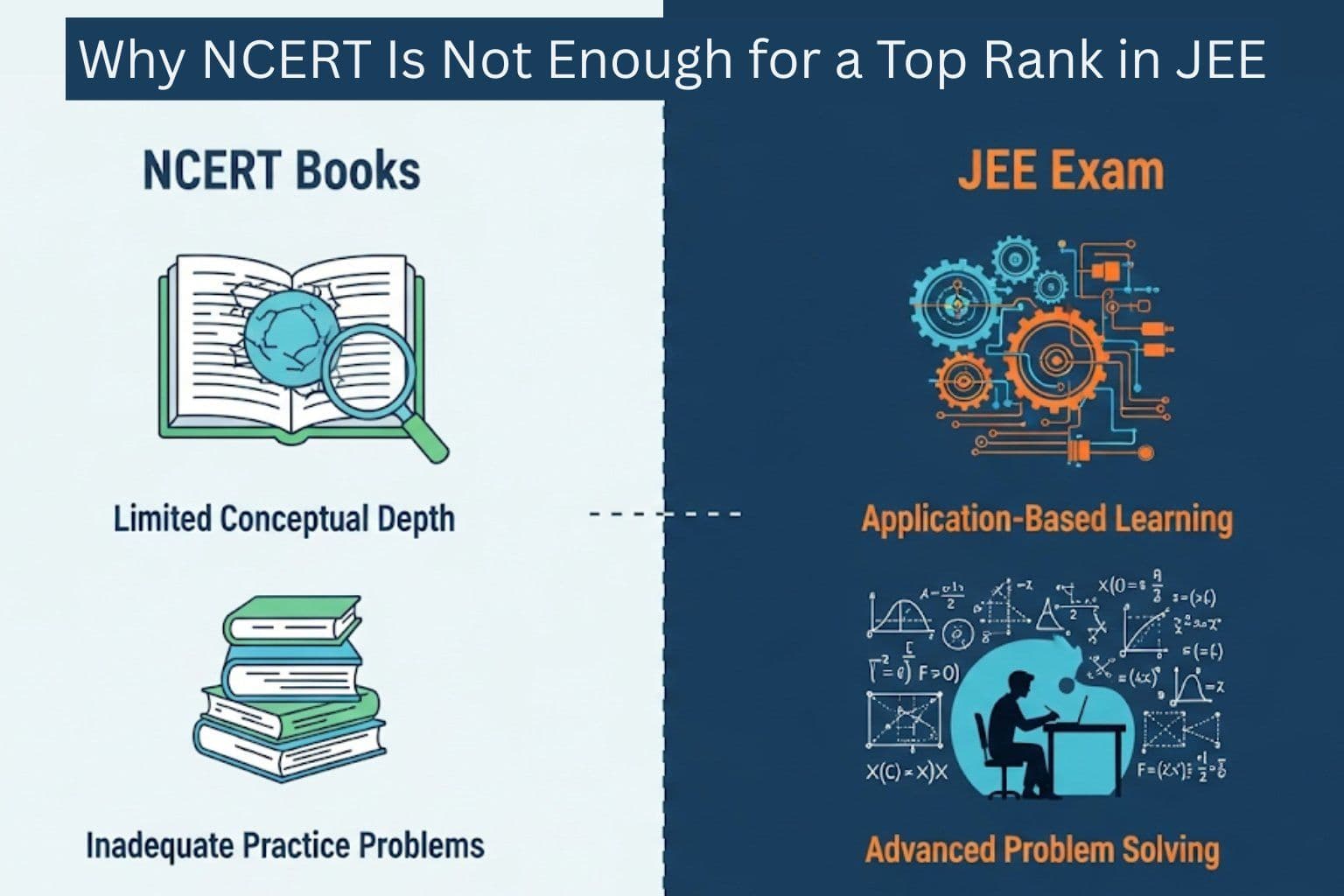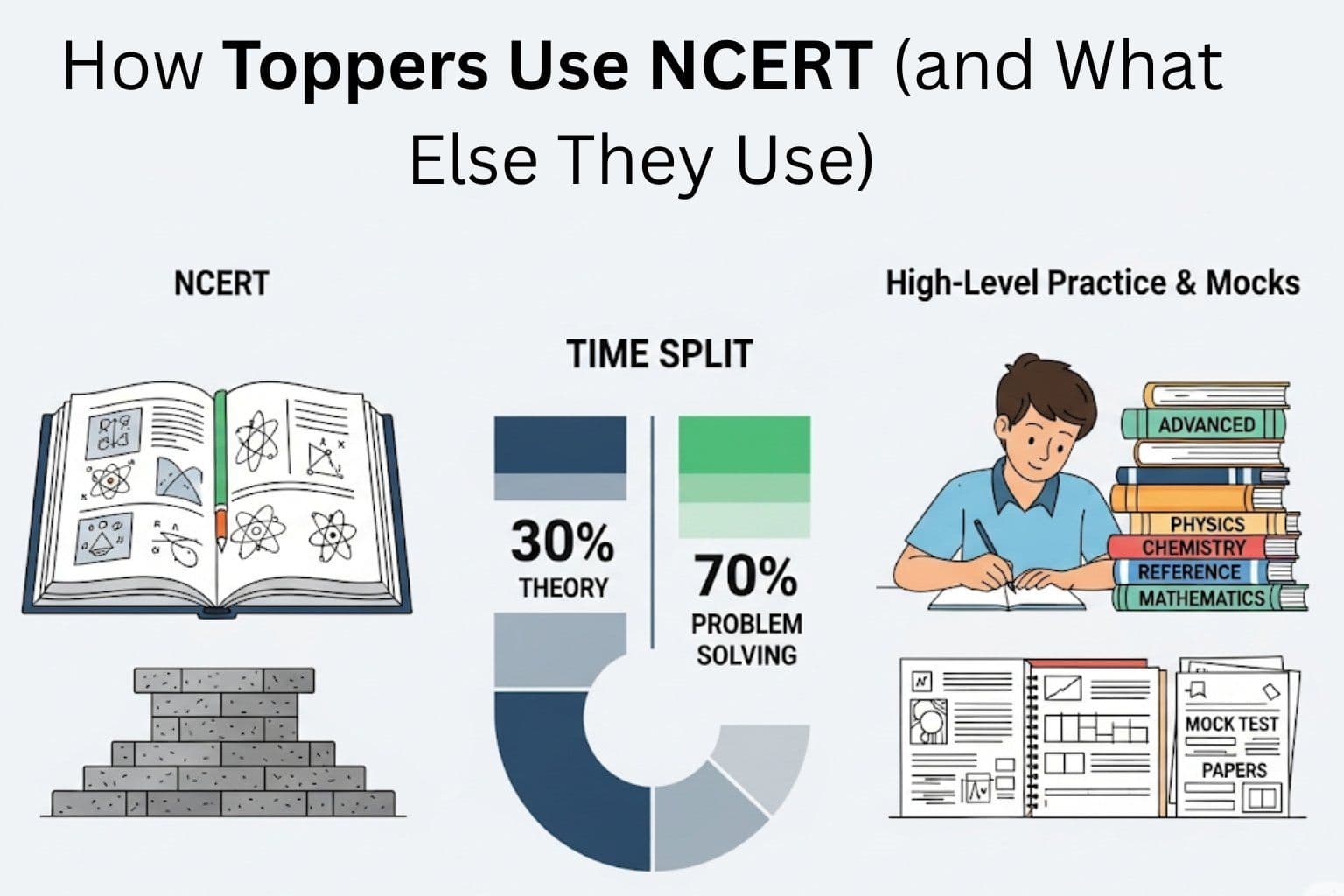Table of Contents
Why NCERT Alone Won’t Get You a Top Rank in JEE – Here’s What You Need
Pratham Jiwnani
8/1/2025

Don’t Rely Solely on NCERT – Here’s Why
NCERT textbooks are the backbone of JEE preparation. There’s no debate about that.
They’re great for building foundational knowledge and are essential, especially for Chemistry.
But if you're aiming for a top 500 rank in JEE Main or JEE Advanced, NCERT alone won’t be enough.
Think of it like this: NCERT gives you the basic tools. But cracking JEE is like building a machine, you need more advanced instruments, techniques, and testing.
In this blog, we’ll break down exactly why relying only on NCERT won’t cut it, what you should supplement it with, and how toppers approach this phase of prep.
Why NCERT Is Not Enough for a Top Rank

1. Limited Conceptual Depth
NCERTs are written to cover the minimum syllabus requirement, not the competitive edge you need for JEE. While the fundamentals are explained, JEE questions often test your understanding in twisted or layered formats.
- In Physics, NCERT barely scratches the surface of problem-solving techniques—questions in JEE Advanced demand multi-step logic and derivation.
- In Math, the NCERT problems are too direct. JEE asks complex integrations, tricky coordinate geometry problems, and multi-topic combinations.
2. Inadequate Practice Problems
NCERT lacks the volume and difficulty level of problems required for JEE.
- JEE is about speed and accuracy. NCERT does not train you for high-pressure, time-bound problem solving.
- There are very few multiple-choice and assertion-reason type questions in the NCERT.
3. Application-Based Learning Is Missing
JEE focuses on application, logic, and innovation. NCERT, by contrast, is primarily focused on information delivery.
- In Organic Chemistry, NCERT lists reactions but doesn’t train you to predict mechanisms or tackle unfamiliar compounds.
- In Physics, you may read about electricity, but without practicing JEE-type circuit problems, your prep will fall short.
What You Need Beyond NCERT to Crack JEE
Here’s what toppers and experts recommend:
1. Reference Books That Go Deeper
- Physics: Concepts of Physics by H.C. Verma, D.C. Pandey series, I.E. Irodov (for Advanced level)
- Chemistry: O.P. Tandon (Physical), M.S. Chauhan (Organic), N Awasthi (Objective), Advanced Problems in Organic Chemistry by Himanshu Pandey
- Math: Cengage, Arihant Series, S.K. Goyal (Algebra), A Das Gupta (Advanced Problems)
2. Daily Mock Tests and PYQs
Practicing previous year questions (PYQs) is a non-negotiable step.
- They show you the actual difficulty and trend.
- You train yourself to apply concepts under pressure.
Start giving topic-wise and full-length mock tests once you finish ~50% of the syllabus. Tools like Crackit Rank Predictor can help you analyze your readiness.
3. Coaching Modules (If You’re in a Coaching Institute)
FIITJEE, Aakash, Allen, and Resonance modules are way ahead of NCERT in terms of difficulty and conceptual range. Solving these regularly gives you exposure to JEE-style questions.
Even if you're self-studying, you can buy used or PDF modules online.
4. Time-Bound Revision Strategy
Top rankers don’t read a book 10 times; they revise strategically:
- Weekly revision of concepts
- Bi-weekly topic-wise test
- Full syllabus mock every 3-4 weeks
What Role Does NCERT Play
Even though NCERT isn’t enough on its own, it’s still a core resource. Here's how to use it smartly:
- Chemistry (especially Inorganic): Read every line. Memorize the NCERT like a fact book. Many JEE Main questions are direct from the NCERT.
- Physics & Math: Use it for theory clarity, then immediately move to higher-level problem sets.
How Toppers Use NCERT (and What Else They Use)

According to the NTA and JAB (Joint Admission Board) guidelines, NCERT is the base, but that’s it. In interviews with the previous year's top scorers:
- NCERT is for the first 3–4 months to build understanding.
- After that, toppers shift focus to high-level practice and mocks.
Toppers recommend:
- 30% theory time
- 70% problem-solving time
FAQs: Real Questions Students Ask
1. Is the NCERT enough for JEE Mains Chemistry?
Yes, for Inorganic Chemistry, the NCERT is enough. But for Organic and Physical Chemistry, you need advanced problem-solving books like M.S. Chauhan or O.P. Tandon.
2. Can I get 200+ in JEE Main by studying only NCERT?
Unlikely. You may reach 120–150, but to cross 200, you need a deeper understanding, speed, and exposure to high-level problems.
3. Should I complete the NCERT first before starting the coaching modules?
Yes, ideally, complete each topic from the NCERT to build concepts, then move to modules or advanced books.
4. How many times should I revise the NCERT before JEE?
Inorganic Chemistry should be revised at least 4–5 times. For other subjects, 2–3 thorough revisions are enough before switching to tougher books.
5. Are JEE Advanced questions ever directly from NCERT?
Rarely. Some factual ones in Chemistry might be, but overall, questions are heavily application-based and not directly lifted from the NCERT.
Final Thoughts: Use NCERT as Your Launchpad, Not the Destination
To sum it up: NCERT is essential, but not sufficient.
- Build your basics with NCERT
- Then, master advanced questions from reference books
- Practice under time pressure with mocks and PYQs
JEE is not just about studying hard; it’s about studying smart. Blend your strategy to cover both depth and breadth.
Want to know when to start mock tests and how to fit them into your study plan? Read this next: When to Start Giving Mock Tests for JEE 2026?
Related Reads:
Categories
Join the Discussion
0 comments